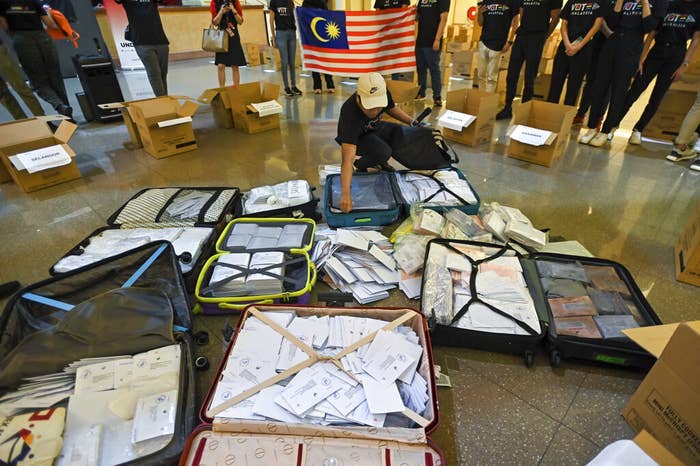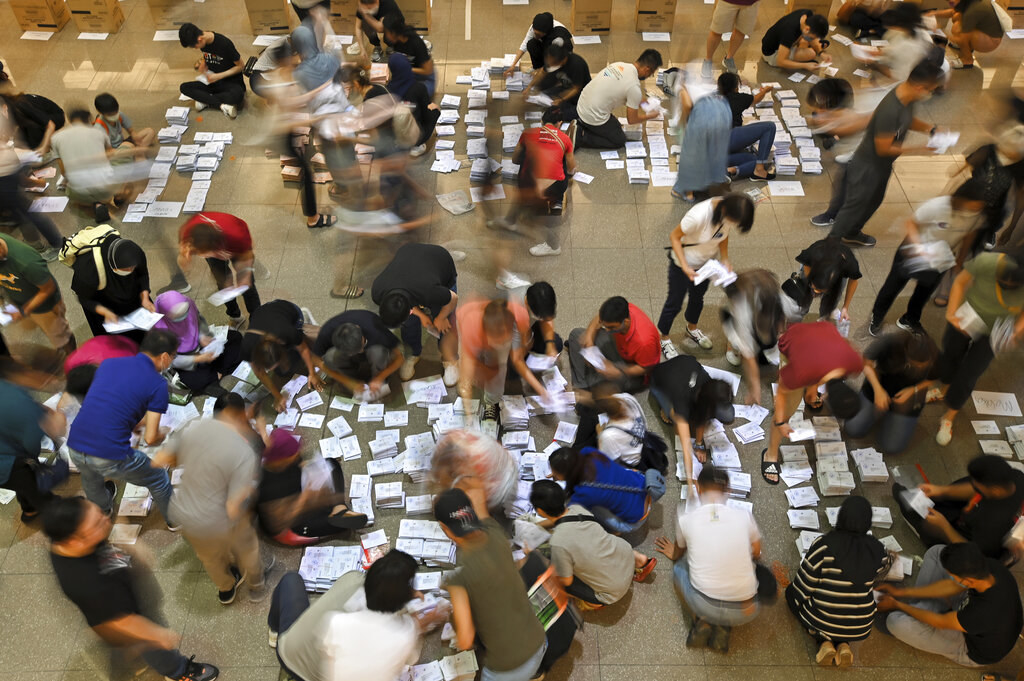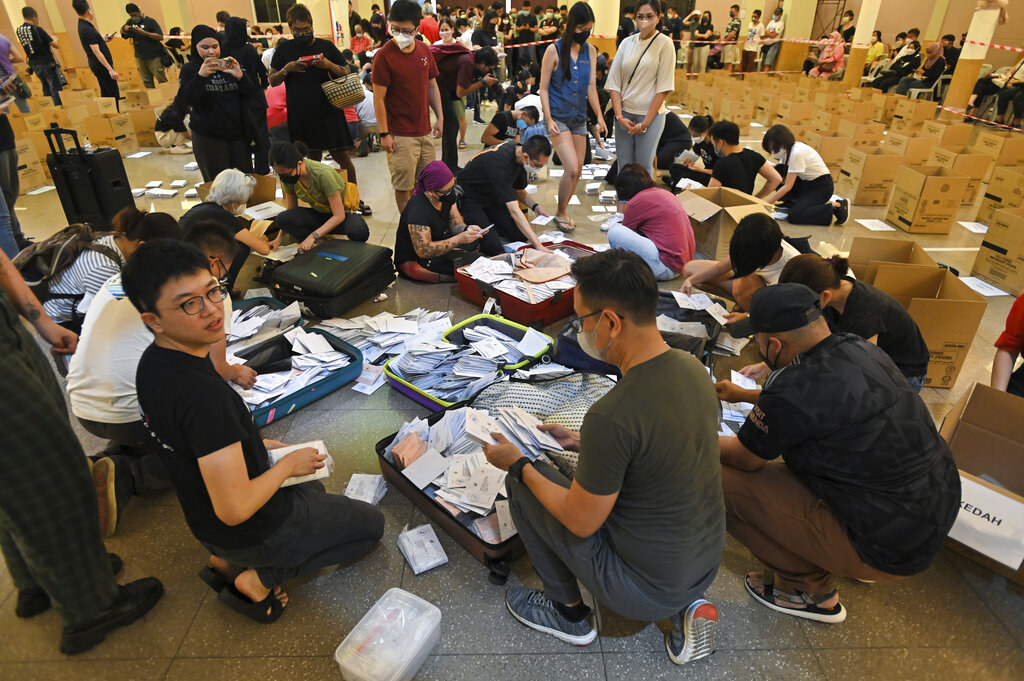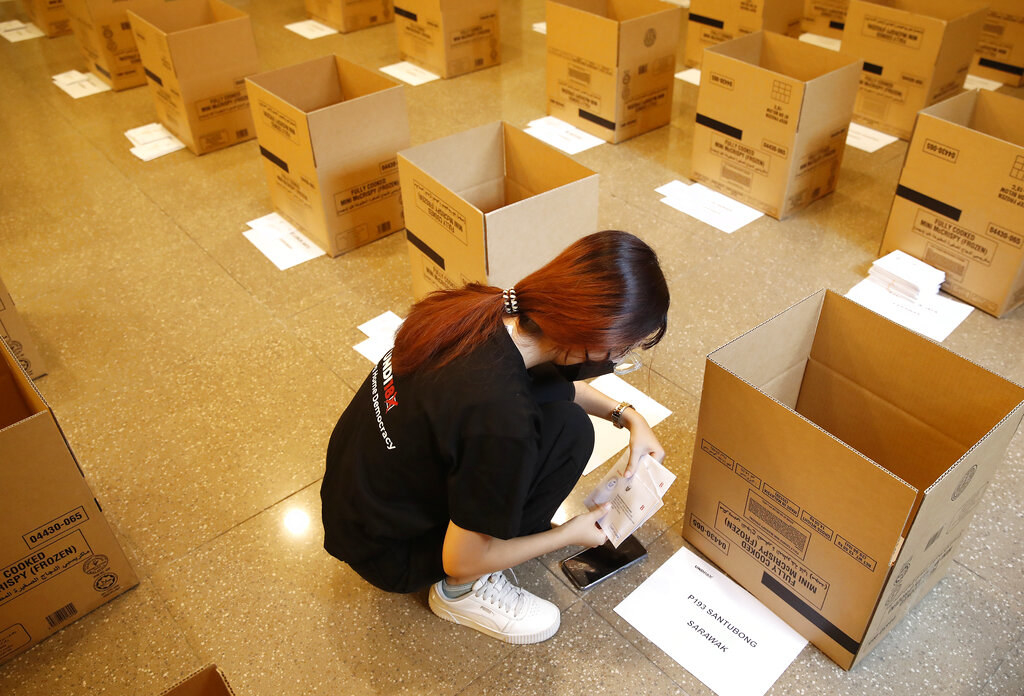
Akmal Razak and his friends embarked on the long drive from Columbus, Ohio, to New York City at 11:30 p.m. on Monday, determined to get to Robyn Choi before she flew out Tuesday night. They carried precious cargo: dozens of postal ballots from Malaysian voters in the US who entrusted Razak and his friends to deliver their votes to Choi, a “flyer” who volunteered to carry the ballots on her flight back to Kuala Lumpur in time for Malaysia’s elections on Saturday.
The Ohio State University students drove 10 hours, making a detour to pick up more ballots from students at Penn State University, and reached Manhattan at 2 p.m. Tuesday. That night, Choi, a Malaysian lawyer who was vacationing in the US, flew out of JFK Airport with more than 250 postal ballots — including mine — in her carry-on luggage.
It was part of an intricate global operation to make sure Malaysian citizens living abroad would get to vote in the general election on Saturday, the first since a power grab in 2020 resulted in a change in government and triggered one of the country’s biggest political crises. In 2018, voters unseated the race-based coalition that had governed Malaysia since its independence from the British in 1957, but the political coup in 2020 led to that very coalition gaining power again, angering many people. In the past four years, Malaysians have cycled through three prime ministers and endured high-profile government corruption scandals, rising costs of living, pandemic lockdowns, devastating floods, and increasingly extreme racial and religious rhetoric by politicians.
Nearly 50,000 overseas ballots were issued starting on Nov. 7, but many only reached voters this week, too late and too costly to be mailed back to their constituencies before polls in Malaysia closed at 5 p.m. Racing against flight schedules, time zones, and geographical hurdles, Malaysians around the world ran a huge coordinated effort to get their ballots on commercial planes back home in time to be counted.
“I actually felt quite humbled,” Choi told me after she landed in Kuala Lumpur, fending off some serious jet lag. “In the big scheme of things, 50,000 votes may not amount to a big dent, but I think the process is important. Every vote is important.”
In the past week, the Malaysian diaspora has hustled to get overseas ballots in Australia, New Zealand, Japan, Dubai, Qatar, China, Vietnam, Hong Kong, India, Switzerland, and the UK onto flights home. A commercial pilot flying from Dubai to Kuala Lumpur carried a duffel bag of ballots with him in the cockpit. Organizers in Germany sent home nearly 1,000 ballots from Malaysians across Europe, Rina Azura, a Germany-based coordinator, told me. Flyers from London carried about 7,000 ballots home.
In Malaysia, the ballots will be sorted and distributed to their polling places by volunteers and voting rights groups like Bersih and Undi 18 beginning Friday.
On Friday night, nearly 33,000 overseas postal ballots were already beginning to make their way to polling locations across the country.

I received my ballot on Monday afternoon, nearly two weeks after my application for a postal vote was approved. Within hours, I was at a Starbucks in Manhattan meeting Brenda Ho, a recent New York University graduate who was collecting postal ballots to hand to Choi. Ho signed off as a witness on my ballot (overseas votes require a Malaysian citizen 18 years or older to be a witness, or saksi), and we made small talk about where we were from and what we were doing in the US. I handed her my voting slip in an envelope and skipped off to dinner, gushing about how straightforward and easy the exchange was.
But it wasn’t that simple, as I later found out. Over the past few days, I watched the frantic posts in Facebook Groups and messages on WhatsApp from people who had only just received their ballots in the mail. There were Google Sheets with contact information for flyers and witnesses, sorted by country, state, and city. Organizers told me they worked around the clock to pick up ballots and tried to get every last one on a plane home. Ho spent part of her Tuesday juggling work, ballot collection, and monitoring her spot in the Taylor Swift concert ticket queue.
“For the past two weeks, our lives have been on hold,” Charlene Wong-Podany, who handled collections in New Jersey, told me.
She and two other Malaysians set up a New York/New Jersey Facebook group to collect ballots that would be going to Choi. They recruited volunteers like Ho to pick up those ballots, and handled requests from people from other states who wanted to mail them to Choi. They discussed alternate plans to get the ballots to Malaysia if Choi’s flight somehow fell through: Someone could travel to Canada or London and hand it to a flyer there, or, if all else fails, one of them would fly to Kuala Lumpur.
The system was deeply Malaysian in spirit — loose yet coordinated, improvised yet thorough, and a lot of last-minute problem-solving. It also required a huge degree of trust in people you’ve never met.
“I don't know if Robyn is going to just chuck our ballots into a pit of fire or she's going to actually bring it to Undi 18, but I'm going to trust that she will,” Tasnim Azman, a Columbia University student who got her ballot to Choi just before she left for the airport, told me. “Because she is going so far to organize and take part in it that the only thing I can really do is trust that.”
Choi hadn’t expected the election to be called while she was away. Parliament was dissolved early, and Malaysians were expecting floods during the monsoon season that begins in November.
“I was very confident that the election wasn't going to be called in November, so I went and bought tickets to go on a holiday,” she said.
She spent the last week of her vacation in the US fielding calls and messages from people who wanted her to bring their ballots home. After landing in Kuala Lumpur on Thursday, she passed her batch of ballots to Undi 18.
Choi told me she recognized the weight of the responsibility and trust that complete strangers had put in her.
“I felt that when I carried those ballots back, especially for every person who took the trouble to be a postal voter and then wait for their ballots, and then getting it to me and me bringing it home — it's important for them,” she said. “And for them to trust me, I think that that was a privilege.”
Getting my ballot to a flyer was easy for me. I was in a major city where lots of other Malaysians lived, and I was lucky that my ballot didn’t arrive any later than it did. But that wasn’t the case for many people, including Razak, the OSU student.
Razak, 22, had organized a collection center at his campus, and his friends had picked up ballots from Malaysians in Wisconsin and Chicago, too. They altogether collected 66 ballots, 38 of which they brought to Choi in New York on Tuesday. The others were flown out to San Francisco to reach a flyer leaving on Wednesday morning.
It was Razak’s first election, and he’d been eager for a chance to vote.
“Since the moment I've been politically aware of how things are in Malaysia, I've been waiting for the day that we can vote for our candidates,” he told me. “It just felt like this is the time where I can do something for my country.”
But Razak never got his postal ballot. When we spoke on Thursday afternoon, it was still on hold at a FedEx location in Memphis, where it had languished since Sunday.
“It does feel a bit demotivating that I couldn't deliver my vote,” he told me. “But I think at the end of the day, having everybody else's votes delivered kind of made up for it. Like, one voice versus 66 voices. I think that's a huge difference.”
Reaching Malaysian voters spread out in North America was a challenge, Timothy Goh, who oversaw the effort in the US and Canada, told me. The geographical expanse of the countries and the flight time to Malaysia (at least 18 hours from either coast) complicated their efforts. Another issue in the US is how disparate the network of Malaysians is, even in larger cities.
“There's not as much regional organizing and community, so we’re not really necessarily aware of each other's presence as much, so that definitely hampered efforts,” he said.
And that’s not taking into account those who live in more rural states, like Montana or Alaska, and are nowhere near another Malaysian who can sign off as a witness on their voting slip.
Goh had experienced the chaos of getting overseas ballots back to Malaysia in the last election in 2018. At the time, there was no NGO-based infrastructure or planning in place to deliver votes back home; people camped out at airports hoping to find someone — anyone — willing to take their ballots home.
Recent voting reforms like automatic voter registration and lowering of the eligibility age from 21 to 18 also expanded the number of overseas votes that organizations were anticipating this year.
“There was this huge, crazy rush to bring back ballots in 2018,” Tharma Pillai, advocacy director for Undi 18, said. This year, the organization prepared for a deluge of ballots on an even larger scale, "because now every single Malaysian student who is studying overseas are going to be voters.”

Wong-Podany said this year’s effort came together again out of necessity.
“It's really sad to say that we have to do this because ideally we do not need to, right? There should be a way for us to bring our ballots home in a timely manner,” she said. “The government should have a game plan for us, but we know that they don't, so therefore we need to take matters into our own hands.”
Azman, the Columbia University student, also admired the volunteer-powered coordination.
“It's like all this community organizing is filling in the gaps that the government — deliberately or not deliberately — made,” she said.

By Friday, the overseas postal voting group on Facebook became almost too chaotic to navigate. There were updates from coordinators in Malaysia and posts from flyers about their journey. Some were still organizing the very last batches of ballots arriving on the morning of Election Day.
Almost every post was filled with comments from people expressing their gratitude for the chance to make their votes count. But many organizers I spoke to in the US were just as moved by people’s desire to vote. For Wong-Podany, the experience helped her feel closer to home, like her community was right here.
“Suddenly you feel that, You know what, Malaysia is not that far away. Malaysia is right here. The kampung is here,” Wong-Podany said. “If you look hard enough, you will find Malaysians.”
